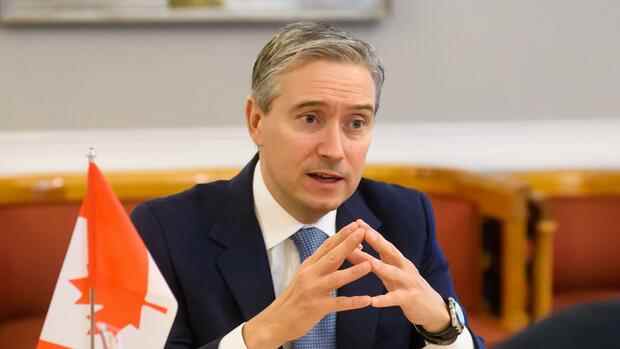The Canadian minister emphasizes the opportunities for cooperation between Germany and his country.
(Photo: Gints Ivuskans, AFP)
London Whenever one looks for like-minded allies in political Berlin in times of crisis, Canada is mentioned first. The second largest country in the world after Russia is more European than some EU countries due to its multilateral trade policy and liberal social policy.
In addition, Canada is the fourth largest oil producer and has rich deposits of raw materials. So what could be more obvious than asking friends in Canada for help in times of energy crisis in Europe?
This is exactly what is already happening, says François-Philippe Champagne, Canadian Minister for Innovation, Science and Industry, in an interview with the Handelsblatt shortly before his visit to Germany: “I have never received so many calls from Germany to find out what we can do together .”
There are many things in common between the countries. “We share the same values and are linked by the Ceta free trade agreement,” says Champagne. Canada and Germany have also already signed a declaration of intent for an energy partnership.
Top jobs of the day
Find the best jobs now and
be notified by email.
The government in Ottawa is willing to help, but its options are limited. “In terms of oil supplies to Europe, we are constrained by our pipeline capacity. We are examining with some partners what we can do on the gas side,” explains Champagne. Looking at the numbers, that’s not a lot.
Canada exports around 3.6 million barrels of oil per day, of which 97 percent is delivered to its large neighbor, the USA. Canadians say they could increase their exports by around 200,000 barrels of oil a day. However, this is only a fraction of what Europe is losing from the oil embargo against Russia.
Things are even worse when it comes to gas: According to the government in Ottawa, Canada can only deliver around 100,000 barrels of natural gas per day. In addition, the Canadians only have one export terminal for liquid gas, which is also on the wrong for Europe because the western coast of Canada. “We need to expand our infrastructure for gas and hydrogen,” admits Champagne. The country needs more capacity on the east coast.
Canada is the world’s fourth largest oil producer.
(Photo: Bloomberg)
“The future belongs to hydrogen, especially in the medium term,” says the minister. Authorities have already approved a carbon-neutral blue hydrogen facility in the city of Edmonton. “And we’re also looking at green hydrogen.”
But Champagne sees other areas in which Germany and Canada can work more closely together. “Supply chains are shifting from the global to the regional level, and many companies want to be present in North America,” says the Canadian. The proximity to the market, but also to the suppliers, has become very relevant. “Canada has all the minerals, like nickel and cobalt, that are important for batteries.”
Champagne emphasizes that his country can also help to make the global supply chains of German car companies “greener”. The Canadian provinces of Quebec and Ontario offer up to 100 percent renewable energy. “And we are also able to produce green aluminum.”
The Ceta free trade agreement has still not been ratified in Germany
Especially in a world where predictability and stability have become scarce, “Canada could be the partner of choice for German automakers,” the minister said. Both countries have a strong industrial base.
The fact that the Ceta free trade agreement is still a contentious issue in Germany and that the traffic light coalition has not yet managed to ratify the free trade agreement, mainly because of resistance from the Greens, has not escaped the attention of the Canadian. “Companies and people in Germany can already see the benefits of the Ceta agreement,” Champagne is certain.
The Federal Constitutional Court has meanwhile rejected all pending lawsuits against Ceta. However, the Greens are sticking to their criticism of the special rights of corporations provided for in the agreement, which they see as a disadvantage for consumers.
“If you’re not ready to sign a trade agreement with Canada, who are you going to sign one with?” the Minister countered with critics. Canada is the only country among the seven major industrial nations (G7) that has free trade agreements with all other G7 countries.
More: Stop of the traffic light in trade policy – CDU and CSU increase the pressure
